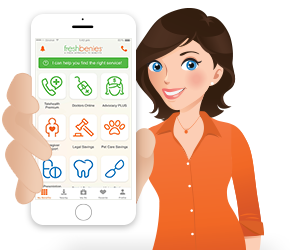6 YEAR-END TIPS TO GET THE MOST OUT OF YOUR HEALTH INSURANCE
Do you hear that? That’s the sound of money being wasted!
According to the Kaiser Family Foundation, premiums have increased 61% in the past decade. If you get insurance through your employer, your contribution has skyrocketed by 83%.
With all that extra money going toward your health insurance, it pays to be a savvy consumer!
There are about 2 months left to the end of the year and the start of a new insurance policy for many Americans. We’re answering some frequently asked questions to make sure you get the most out of your policy and budget!
FAQ #1: I haven’t gotten close to reaching my deductible or out of pocket max. Is there anything specific I should do?
ANSWER & TIP:
Congratulations, you’re healthy! To get the most value out of your plan (don’t waste your hard-earned cash), take advantage of the covered preventive services. For instance, be sure to have your annual physical and ladies, get your mammogram (click here to read an article I wrote about the importance of these things). If you have vision and dental insurance, get your eye exam and teeth cleaning.
FAQ #2: I need to have a non-emergency procedure, and...
...I’m nowhere near reaching my deductible. Should I do it?
ANSWER & TIP:
If it’s truly a non-emergency, don’t do it now – wait until the first of the year (or the beginning of your plan year). Let’s say you have it done in January instead. You’d have time to plan it, budget it, schedule it - and you could meet your deductible and/or out of pocket max in the first few months of the year, leaving the rest of the year’s medical expenses paid for by your insurance. At the least, the costs will go toward your deductible and out of pocket max for the rest of the year.
...I’ve reached my deductible. Should I do it?
ANSWER & TIP:
This doesn’t necessarily mean that every medical expense is covered from here! Be sure to look at your policy for the difference between your deductible and your out of pocket maximum. Then, get an estimate on the cost of the procedure to see if it makes sense to do it now or wait until next year. You’ll probably still want to have it done now since insurance will likely be paying for the bulk of it. To get a cost estimate on a procedure, try a health advocacy service with experts that can help (click here for an article I wrote about my experience).
...I’ve reached my out-of-pocket max. Should I do it?
ANSWER & TIP:
Get it ALL taken care of before the end of the year since your insurance will be paying for it. A few more tips:
**Tell your doctor you’ve reached your out-of-pocket maximum for the year and ask if there’s any needed follow-up care that can be booked and billed prior to 12/31.
**Book your procedure NOW! Many people are doing last minute procedures for this same reason - you could say it’s like Christmas for hospitals. If you can’t get a confirmed booking, ask to be on the cancelation list.
**Be sure to keep all your receipts and check with your tax preparer or accountant – high medical expenses can be tax deductible.
FAQ #3: I still have funds in my FSA. What should I do?
ANSWER & TIP:
FSAs (Flexible Spending Accounts) are a “use it or lose it” situation. With some exceptions, if you don’t spend every dollar by 12/31 (or the end of your plan year), *poof* it all goes away. If you saved a little extra this year for a procedure and haven’t done it, NOW is the time.
If you have money in an FSA account but no foreseeable medical expenses, here are a few ideas: an extra pair of glasses, stock up on contacts, have some dental work done, refill some prescriptions, get a hearing test, try an alternative treatment like acupuncture or chiropractic, etc. Aetna has created thissimple chart you can scan for other ideas on how to spend that money burnin’ a hole in your account!
FAQ #4: I still have funds in my HSA. What should I do?
ANSWER & TIP:
An HSA (Health Savings Account) can roll over to next year and the next year and so on. It’s like an IRA for your healthcare - let it roll over and build up so it’s there when you really need it.
Since the money is tax-deferred, putting more into your HSA at the end of the year can be a good investment vs. paying taxes on it as income. Check with your tax preparer or accountant to see if it’s a good idea for you!
FAQ #5: I still have funds in my HRA, so what?
ANSWER & TIP:
An HRA (Health Reimbursement Arrangement) is a program some employers provide for employees. If you have an HRA, your employer probably adds money to the account each year to help you pay for healthcare expenses. Here’s the deal: that money is owned by your employer and you can only use it as long as you’re employed there.
Are you considering a job change? If so, use the money before you leave! Once you walk out the door, the funds are no longer available to you. If you’re planning to stick around at your job for a while, let it roll over to the next year and use it when you have more of a need.
Some employers specify which medical expenses the HRA funds can be used for, so be sure you know your employer’s rules (for instance, they could say they only want it used for medical expenses – they could exclude vision and dental expenses).
FAQ #6: How can I prepare as I choose next year’s plan?
ANSWER & TIP:
Click here to read an article I recently wrote called “5 Health Insurance Plans: What’s Right for You?”
For people who purchase on their own, insurance companies will publish new 2016 plan options and rates around November 1st, which is when you can start shopping. While the article will help you plan, I highly recommend scheduling an appointment with your local insurance broker NOW. If you don’t know one, contact me at heidi@freshbenies.com and I’ll help find a professional near you. Using an insurance broker is no additional cost to you (they’re paid by the insurance companies) and you can use them whether you qualify for government help or not – they’ll help you through that, too.
If you get your insurance at work, your employer has most likely already worked with an insurance broker to come up with your plan choices. And if you’re an employer, having a trusted advisor is even more important. Times are a-changin’, so make sure you change with them.
When I have conversations with people about their health insurance, I hear them say they’re paying a lot of money for not a lot of benefit. Of course, in a year when illness strikes, we’re very happy to have it. In a healthy year, these are some simple steps we can take to maximize our investment!
What tricks do you have for getting the most bang for your insurance buck at the end of the year? Any tax tips you’d like to share? Comment below and let us know!















